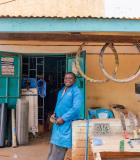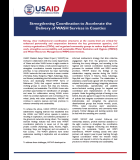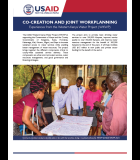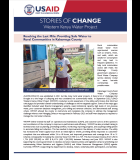Maternal and Child Survival Program – Kenya (MCSP-Kenya)
The Maternal and Child Survival Program (MCSP) is a global flagship project that introduces and supports high-impact health interventions with a focus on 25 high-priority countries* with the ultimate goal of ending preventable child and maternal deaths within a generation. The Program is focused on ensuring that all women, newborns and children most in need have equitable access to quality health care services to save lives. MCSP supports programming in maternal, newborn and child health, immunization, family planning and reproductive health, nutrition, health systems strengthening, water/sanitation/hygiene, malaria, prevention of mother-to-child transmission of HIV, and pediatric HIV care and treatment.
Awarded in the spring of 2014, the Maternal and Child Survival Program engages governments, policymakers, private sector leaders, health care providers, civil society, faith-based organizations and communities in adopting and accelerating proven approachesl. The Program will tackle these issues through approaches that also focus on health systems strengthening, household and community mobilization, gender integration and eHealth, among others. With approaches tailored to meet individual country needs, the Program seeks to empower countries to design effective approaches, develop technical skills, apply analytical tools, manage workforce capacity and devote resources to reduce inequities in care and build sustainable health systems to keep mothers, newborns and children alive and healthy.
Activity Description
In Kenya, the project aims to accomplish these two objectives:
- Objective 1: Strengthen the core capacities of county governments and health teams to increase coverage and utilization of evidence-based, sustainable, high-impact interventions in: reproductive, maternal, newborn, and child health (RMNCH); nutrition; and water, sanitation, and hygiene (WASH) interventions;
- Objective 2: Foster an enabling environment, and promote program learning, documentation, and dissemination for improved RMNCH, nutrition, and WASH outcomes.
The project has been implementing the community-led total sanitation (CLTS) approach in the villages in both counties.
Expected Outcomes
The project expects to:
- Support countries to increase coverage and utilization of evidence-based, high-quality reproductive, maternal, newborn and child health (RMNCH) interventions at the household, community and health facility levels;
- Close innovation gaps to improve health outcomes among high-burden and vulnerable populations through engagement with a broad range of partners;
- Foster effective policymaking, program learning and accountability for improved RMNCH outcomes across the continuum of care.
Actual Outcomes
The project accomplished:
- Training of CHVs and community units followed by supervision has resulted in an increase in latrine coverage of 18% among households in Migori and 6% among households in Kisumu in PY2;
- 38 villages in Migori and 58 in Kisumu received a third party’s Open Defecation Free certification from the Kenya Water for Health Organization (KWAHO).






